The locust outbreak plaguing East Africa calls for a concerted international response as the most dreaded insects devour millions of hectares of vegetation in their cross-border migration, exacerbating the already fragile food security situation in the region.
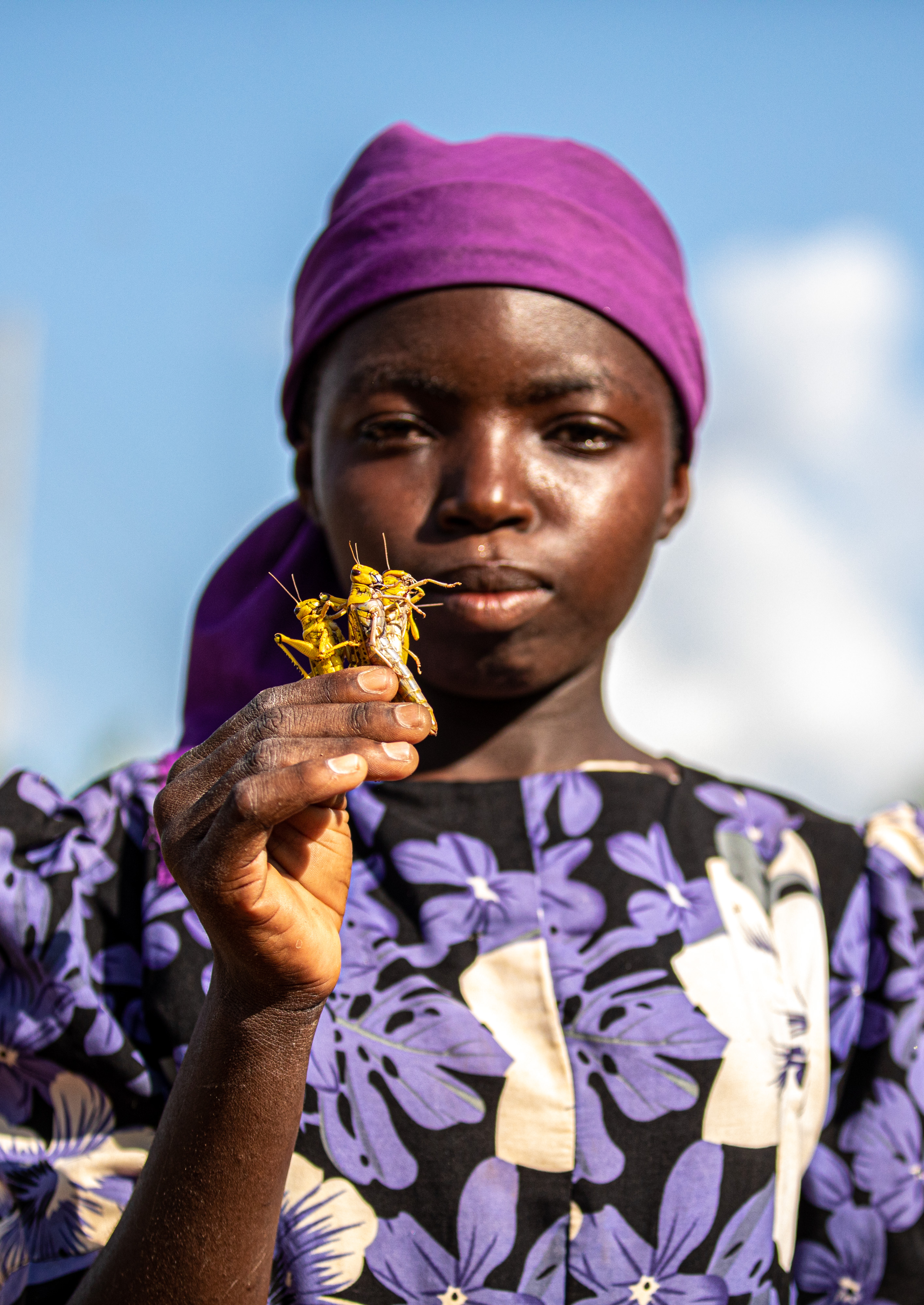
A girl shows the desert locusts in Kitui County, Kenya, Feb. 20, 2020. (Xinhua/Zhang Yu)
by Xinhua writers Bai Lin, Bedah Mengo
NAIROBI, Feb. 22 (Xinhua) -- The locust outbreak plaguing East Africa calls for a concerted international response as the most dreaded insects devour millions of hectares of vegetation in their cross-border migration, exacerbating the already fragile food security situation in the region.
The desert locust, which can travel 150 km in a single day, is deemed the most devastating of locusts. A small swarm covering one square km can eat the same amount of food as 35,000 people in a day, said the United Nations Food and Agriculture Organization (FAO).
"The situation remains extremely alarming in Kenya, Ethiopia and Somalia where widespread desert locust infestations and a new generation of breeding threaten food security and livelihoods in the region," it noted Tuesday.
The locusts most recently invaded South Sudan from Uganda, and the South Sudan government is seeking funds worth 20 million U.S. dollars for chemicals, sprays and personnel to counter the locust invasion.
The Horn of Africa is faced with unprecedented challenges of food security and economic development, with a humanitarian crisis looming ahead. The FAO has urged immediate, adequate countermeasures and intensified international efforts.
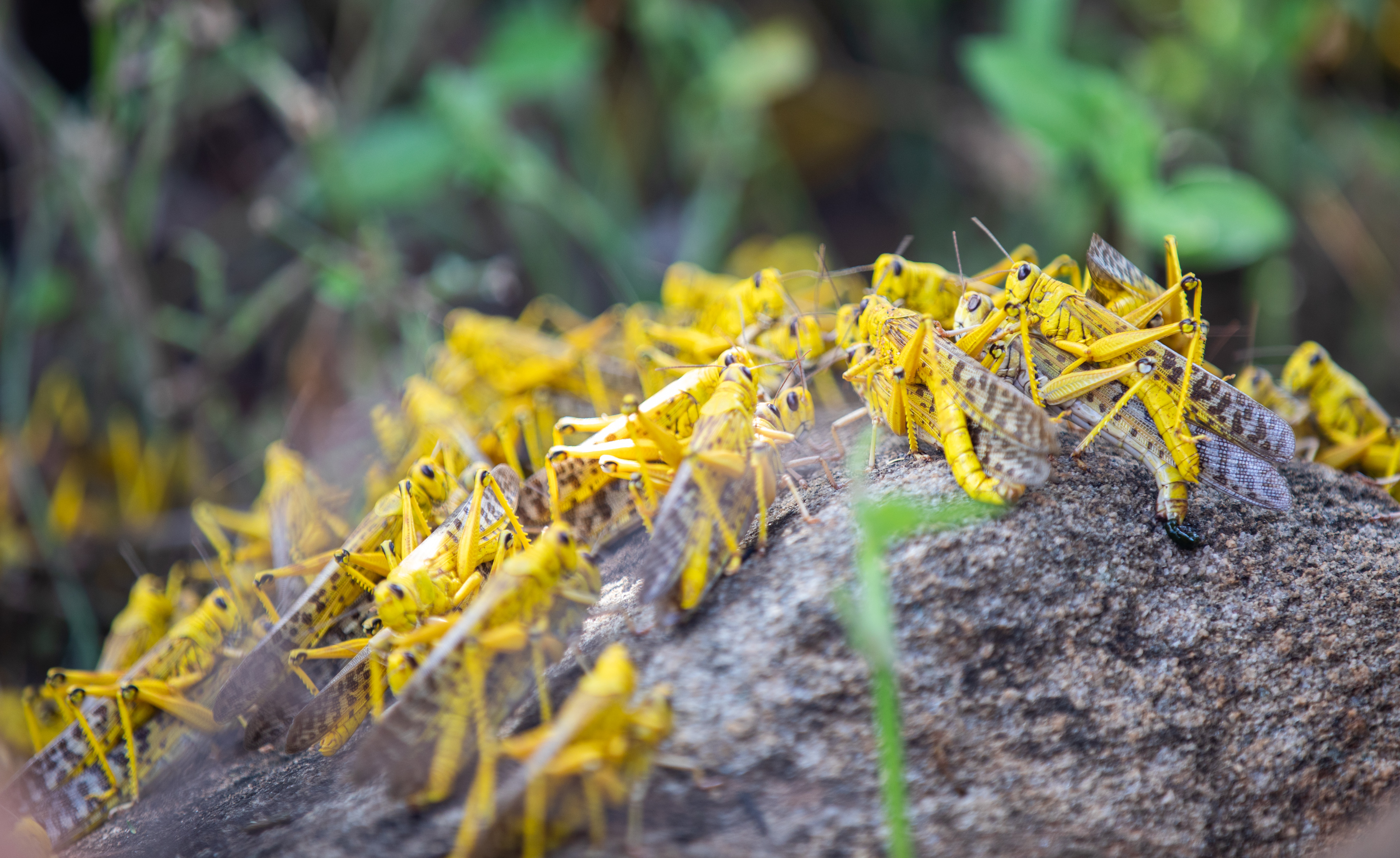
A swarm of desert locusts invade parts of Mwingi Town in Kitui County, Kenya, Feb. 20, 2020. (Xinhua/Zhang Yu)
EAT AWAY HOPE
The locust outbreak is the worst in 70 years in Kenya, and the worst in 25 years in Somalia and Ethiopia, where the insects bred before spreading to Kenya and other countries.
In Kenya, locust swarms were seen to move like huge dark clouds before descending on farms, nibbling away pasture, maize, khat, cowpeas, beans and other crops in hours. Areas like Mandera and Isiolo in the north, and Tharaka Nithi in central Kenya, were attacked again after aerial chemical pesticides spraying.
Although the government has sprayed pesticide and other chemicals on a wide range of areas in order to curb the locust outbreak, at least 18 of Kenya's 47 counties were affected.
Kello Harsama, the administrative secretary heading the State Department for Crop Development under Kenya's Ministry of Agriculture, said the government will work with the FAO to train 600 chemical spraying personnel.
"Aerial spraying of the pesticide in the last two months is yet to achieve desired results, thus we need to devise innovative strategies like the use of the trainees, farmers and extension workers to conduct ground spraying starting with northern counties of Isiolo, Marsabit, Turkana and Wajir," he said.
"My crops had done well following the heavy rains and I was looking forward to a bumper harvest but then the locusts came and ate away my hope," Beatrice Ngari, a farmer in Embu, central Kenya, told Xinhua. But Ngari was unaware that it is also the predicament of many farmers across Kenya, Somalia, Ethiopia, Tanzania, South Sudan and Uganda.
The rains between October and January served to provide a favorable environment for locusts to breed and thrive, including properly moist soils for them to lay eggs in millions before migration and the consequent lush vegetation to eat, according to the FAO.
Climate change was to blame for the unusually plentiful rainfall on the African continent. Keith Cressman, the FAO's senior locust forecasting officer, further identified the recent cyclones as another factor behind the locust crisis, saying the past 10 years saw increased frequency of cyclones in the Indian Ocean.
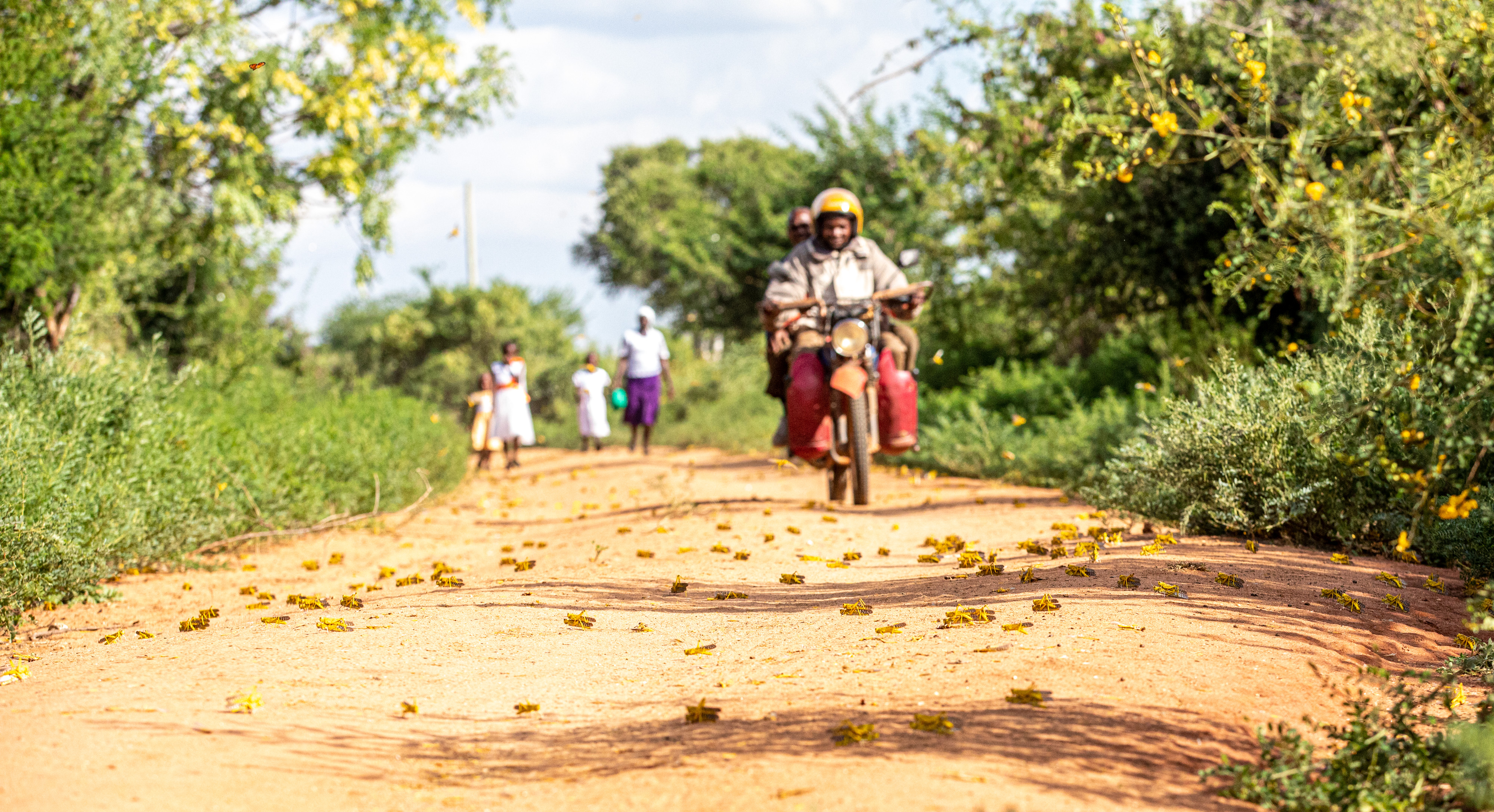
A swarm of desert locusts invade parts of Mwingi Town in Kitui County, Kenya, Feb. 20, 2020. (Xinhua/Zhang Yu)
AGGRAVATING FOOD INSECURITY
FAO officials said the locust outbreak has worsened the food insecurity in Africa, citing some 239 million people in sub-Saharan Africa suffering from hunger and malnutrition, and over 20 million having already been in food crisis in Horn of Africa countries.
UN Undersecretary-General for Humanitarian Affairs and Emergency Relief Coordinator, Mark Lowcock, said the current situation "is really, really challenging."
"There are currently over 30 million people in the affected countries, who are severely food insecure now. Ten million of those people are in the places affected by the locusts. Unless we get a grip of this in the next two or three or four weeks, we would have a serious problem," he stressed.
To avoid a famine, University of Nairobi professor Evaristus Irandu said the government may have to use the scarce foreign currency to import food products, adding that poverty will increase in the country.
"All our investment is going down the drain. The sorghum and millet crops were about to mature and we would have harvested next month," said Nathan Njiru, a farmer in Tharaka Nithi, whose livelihood largely depends on selling sorghum to Nairobi's beer brewers.
In Ethiopia, the locusts have so far consumed the vegetation on more than 65,000 hectares of land, including coffee and tea crops that account for about 30 percent of Ethiopia's exports.
A Moody's Investors Service report issued in early February showed that agriculture contributes about one-third of the gross domestic product in East Africa and more than 65 percent of jobs in all regional countries except for Kenya.
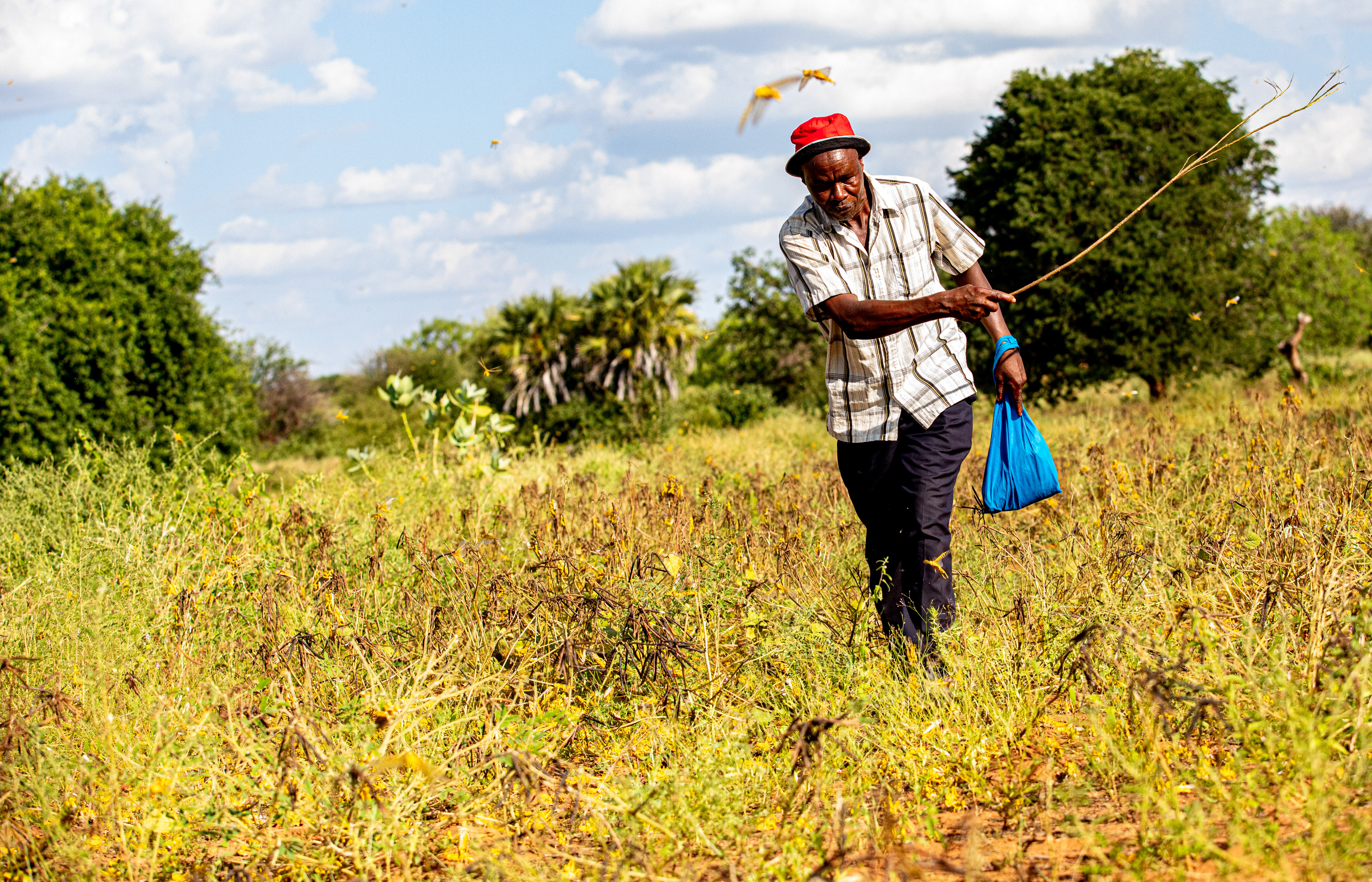
A farmer attempts to scare away desert locusts in Mwingi Town in Kitui County, Kenya, Feb. 20, 2020. (Xinhua/Zhang Yu)
INTERNATIONAL COOPERATION URGED
The desert locust swarms have travelled from Africa to Asia. India is suffering the worst hit in 60 years.
"Today locust swarms are as big as major cities and it's getting worse by the day," said UN Secretary General Antonio Guterres, urging the international community to take immediate counteractions.
Sacko Josefa, AU Commissioner for Rural Economy and Agriculture, said earlier this month that the 55-member pan-African bloc is working directly with the FAO to make sure that there is no spread to other countries.
Antonio Querido, UN FAO representative in Uganda, said international organizations are providing technical support and mobilizing resources for Uganda as it strives to fight the locusts.
In order to get more international help, Somalia on Feb. 2 declared the locust infestation a national emergency.
Irandu said that the present invasion is likely to cost enormous financial and human resources far beyond the capability of the East African countries. Hence there is a need for a concerted effort by regional and other international organizations to offer money, expertise and equipment such as planes. Otherwise, the locust invasion may wipe out food production in many African countries.
The FAO recently launched a 76 million U.S. dollars appeal to control the locusts' spread. Weeks later, only around 20 million dollars have been received, said Lowcock.
Irandu suggested that intensified international efforts should be made to coordinate aerial sprays, share scientific knowledge on breeding and migratory habits of locusts, and raise funds from partners.
In the long run, experts have called for the investment in research to contain the impacts of climate change, including the locusts invasion.
"People must be sensitized adequately on their roles in adaptation and mitigation programs to ensure uniformity in progress," said Edward Mungai, chief executive officer of Kenya Climate Innovation Center.
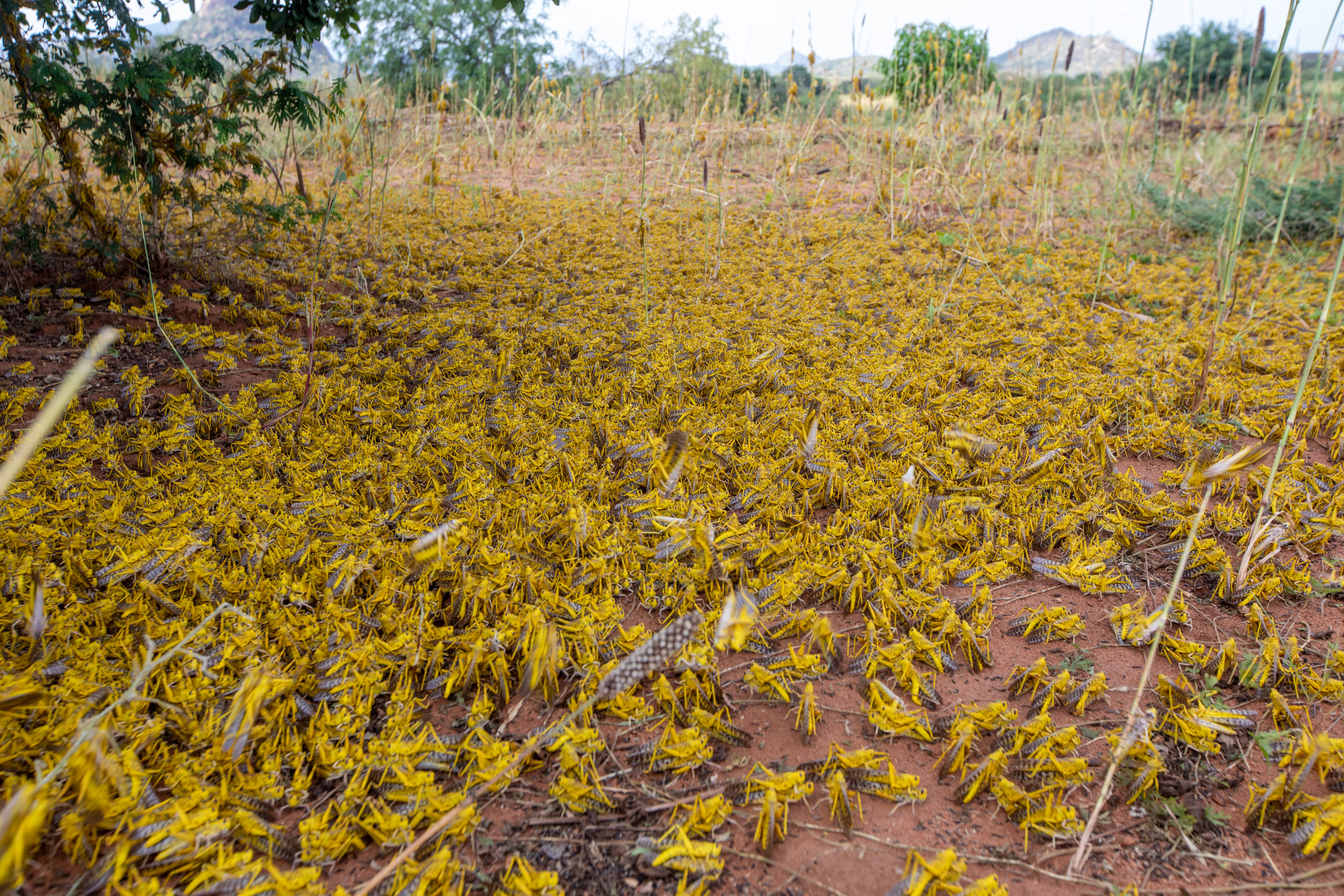
A swarm of desert locusts invade parts of Mwingi Town in Kitui County, Kenya, Feb. 20, 2020. (Xinhua/Zhang Yu)
(Xinhua reporters Cao Kai and Wang Xiaopeng in Nairobi also contribute to the story.)
(Viedo editor: Liu Yuting)
(Video reporters: Liu Ruijuan, Feng Yiwei, Wang Shoubao, Ruth Baru, Eric Nzioka, Zacharia)



